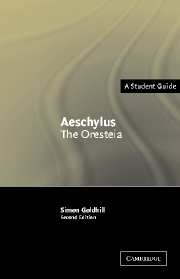Preface
Published online by Cambridge University Press: 05 June 2012
Summary
There could be few works more suitable for the Landmark series than Aeschylus' trilogy, the Oresteia. It was a landmark from its first performance, recognized as the greatest work of a playwright who was recognized as the figurehead of the flourishing of tragedy in classical Athens. He still is. The Oresteia was, first of all, for the Greeks themselves, simply the most influential play ever written. Its dramatic techniques, narrative development and dense poetry changed the course of Greek and hence European drama. It is the play to which Euripides and Sophocles, the other great surviving playwrights of the fifth century, turned again and again in homage, competition and imitation. From here comes Western theatre.
What is more, particularly since the Romantic period, the Oresteia has had a continuing and powerful influence on European cultural production. It is the work Wagner struggled to mirror in the Ring; for Marx and Engels it is a central text in the development of their ideas on the family, private property and the state; T. S. Eliot, Sartre, O'Neill offer versions; Nietzsche and Hegel take it as a central example in their writings; from Kate Millett through to Hélène Cixous it has proved an important text for feminist cultural politics. With startling new performances in Paris, Berlin and London in recent years, the play has provoked new audiences to debate. The Oresteia is not a preserved monument, but the site of a continuing and profound engagement.
- Type
- Chapter
- Information
- Aeschylus: The Oresteia , pp. vii - viiiPublisher: Cambridge University PressPrint publication year: 2004



